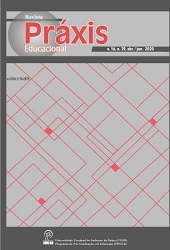GESTIÓN DE RIESGOS Y FINANCIACIÓN DE LA EDUCACIÓN SUPERIOR DESARROLLO INNOVADOR BAJO LOS CAMBIOS CIVILIZACIONALES
DOI:
https://doi.org/10.22481/praxisedu.v16i39.6379Palabras clave:
innovador, sociedad, gestión de riesgos, financiación de la educaciónResumen
La investigación de la información y el desarrollo del progreso de alta tecnología en el aspecto socio-humanitario nos permitió revelar sus consecuencias en el contexto de los desafíos naturales y civilizacionales y las áreas de financiamiento de la educación. La gestión de riesgos y las tendencias generales se aclararon del desarrollo educativo innovador en las instituciones en la era del progreso de la alta tecnología de la información y los cambios naturales y civilizacionales, que han creado oportunidades fundamentalmente nuevas para justificar las estrategias educativas y deberían basarse en las categorías de la pedagogía. de la dirección del espacio noosférico. Por lo tanto, es necesario construir nuevas teorías pedagógicas sobre la síntesis de enfoques filosóficos-educativos, filosóficos-antropológicos, poliparadigmales, civilizacionales-formativos y culturales. De acuerdo con este principio, el aprendizaje permanente se vuelve importante para enfrentar los desafíos del progreso moderno y contrarrestar los cambios destructivos naturales y de civilización.
Descargas
Citas
Andrushchenko, V. (2015). Higher education post-Bologna space: attempt прогностического the analysis. Philosophy of formation, 2, 6–19.
Bodnar, S., Mirkovich, I., Koval, V. (2019). Human capital development in Ukrainian education system by means of language integrated teaching. Dilemas contemporaneos-educacion politica y valores, 7 (SI), 14.
Borychenko, K., Hudz, A., Koval, V., Golubkova, I., Mazur, A. (2019). European standards for social protection of internally displaced persons. Dilemas contemporaneos-educacion politica y valores, 7 (SI), 88.
Bukanov H., Kolesnyk A., Tashkinova O., Kotlubai V., Koval V. (2019). Social marketing in public administration of social service institutions. Revista Genero & Direito, 8 (6), 457-468.
Fukuyama, F. (2002). Our Posthuman Future: Consequences of the Biotechnology Revolution. New York: Pikador (Farrar, Straus and Giroux).
Kaku, M. (2011). Physics of the Future: How Science Will Shape Human Destiny and Our Daily Lives By the Year 2100. New York: Doubleday.
Koval, V., Petrashevska, A., Popova, O., Mikhno, I., & Gaska, K. (2019). Methodology of ecodiagnostics on the example of rural areas. Architecture Civil Engineering Environment, 12(1), 139-144. doі: 10.21307/ACEE-2019-013
Koval, V., Polyezhayev, Y., & Bezkhlibna, A. (2018). Communicative competences in enhancing of regional competitiveness in the labour market. Baltic Journal of Economic Studies, 4(5), 105-113. doi:10.30525/2256-0742/2018-4-5-105-113
Koval, V., Pukała, R. (2017). Implementation of regulatory policy in economic activity: development of the institute regulatory impact assessment. Economics. Ecology. Socium, 1(1), 24-32.
Kvitka, S., Starushenko, G., Koval, V., Deforzh, H., & Prokopenko, O. (2019). Marketing of Ukrainian higher educational institutions representation based on modeling of Webometrics Ranking. Marketing and Management of Innovations, 3, 60-72. http://doi.org/10.21272/mmi.2019.3-05
Lantsev, I. (2015). Strategies, Goals the and Objectives of advanced education in the light of the eschatological expectations and futuristic progections. Future Human Image, 2(5), 149–163.
Lem, S. (2013). Summa technologiae. Minneapolis: University of Minnesota Press.
Luchaninova, O., Koval, V., Deforzh, H., Nakonechna, L. & Golovnia, O. (2019). Formation of communicative competence of future specialists by means of group work. Espacios, 40 (41), 11.
Medynska, А. (2018). The factors affecting to the quality of life the Ukrainian people. Innovative economics and management, 3, 126–132.
Mushynska, N. (2018). Means of future economists’ professional self-development in the educational process of foreign language studying. Economics, Ecology, Socium, 2(3), 45–56.
NMC Horizon Report (2016). Higher Education Edition, 2016. http://www.edu-trends.info/education-news-january-2016/
Polischuk, N.V. (2018). Features of transformation of education and spirituality in an era of globalization and cosmization. Scientific and theoretical almanac «Grani», no 21(8), 103–111. doi: 10.15421/1718107 [in Ukrainian].
Polishhuk, N.V. (2018). Educational strategies in the vector of civilizational progress. Social and economic aspects of sustainable development of regions, Opole: The Academy of Management and Administration in Opole, 222–232.
Sagan, C (1973). Communication with Extraterrestrial Intelligence (CETI). Cambridge, MA: MIT Press.
Schewe, M. (2003). Teaching intelligently by feeding multiple learner intelligences – through drama. Inozemni movy [Foreign languages], 4, 53-55.
Shamilishvili, G. (2019). Psychological influence of modern mass media on formation of gender stereotypes. Economics. Ecology. Socium, 3(2), 71-76. https://doi.org/10.31520/2616-7107/2019.3.2-8
Shejko, V.M. (2001). Culture. A civilization. Globalization (end ХІХ – beginning ХХІ of century). (Vol. 1). Kharkiv: Osnova [in Ukrainian].
The law of Ukraine On Formation (2017). Data of the Supreme Rada, no 38-39, st.380. http://zakon.rada.gov.ua/laws/show/2145-19> [in Ukrainian].
Voznyuk, О.V. (2014). Theoretical-methodological bases of development of the person of the teacher in conditions a civilization of changes. Аbstract of the D.Sc. Disserttation. Ivan Franko Zhitomir State University [in Ukrainian].
Zlotnikova, L. (2016). Humaniterian problems in the context of upgrade. Innovative economics and management, 2, 26–30.
Каrpenko, М.М. (2017). Prospects of introduction of innovative forms of formation in Ukraine. National institute of strategic researches. An analytical note.
Descargas
Publicado
Número
Sección
Licencia
Você é livre para:
Compartilhar - copia e redistribui o material em qualquer meio ou formato; Adapte - remixe, transforme e construa a partir do material para qualquer propósito, mesmo comercialmente. Esta licença é aceitável para Obras Culturais Livres. O licenciante não pode revogar essas liberdades, desde que você siga os termos da licença.
Sob os seguintes termos:
Atribuição - você deve dar o crédito apropriado, fornecer um link para a licença e indicar se alguma alteração foi feita. Você pode fazer isso de qualquer maneira razoável, mas não de uma forma que sugira que você ou seu uso seja aprovado pelo licenciante.
Não há restrições adicionais - Você não pode aplicar termos legais ou medidas tecnológicas que restrinjam legalmente outros para fazer qualquer uso permitido pela licença.












